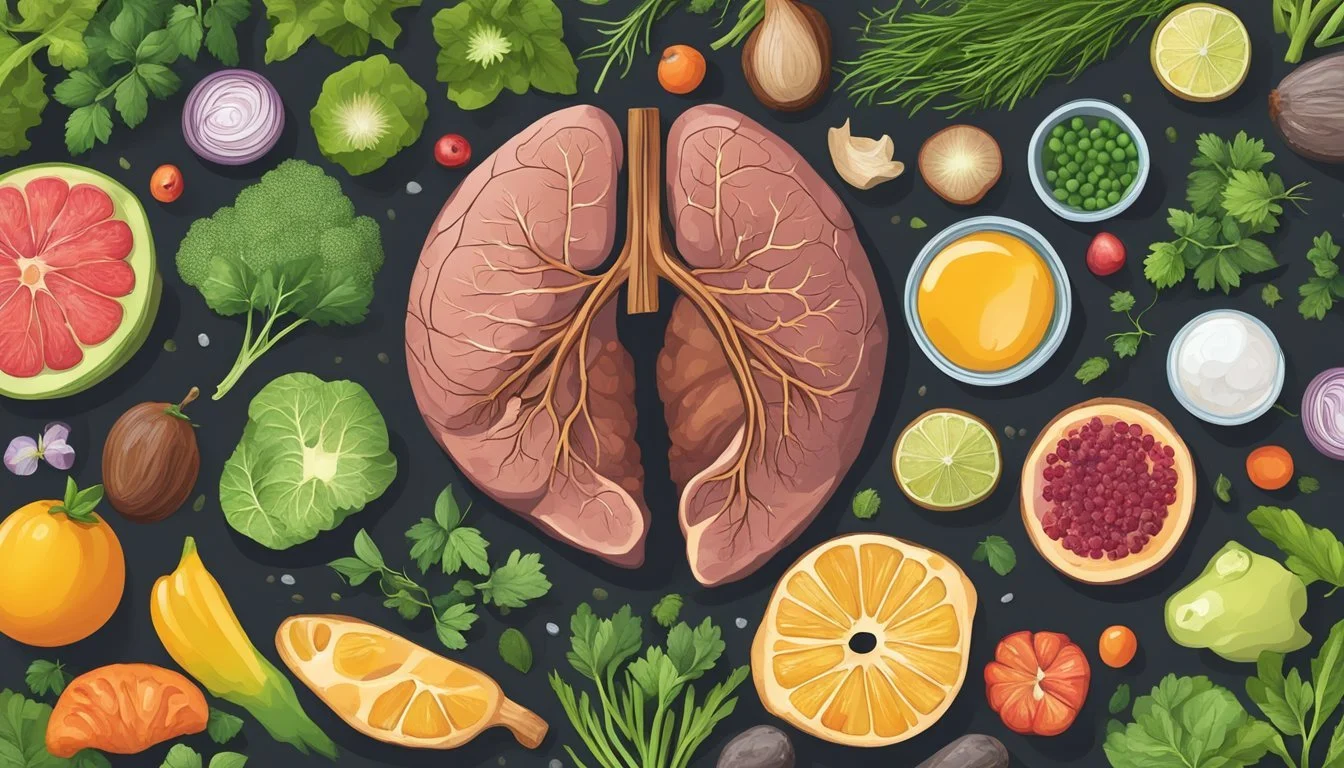The Myth of the Liver Cleanse Diet
Debunking Detoxification Claims
The liver plays a vital role in detoxifying the body, metabolizing substances, and aiding in digestion. In modern wellness circles, the concept of a "liver cleanse diet" has gained traction, promising a reset for the body's internal cleaning system. However, this approach has sparked debate among health professionals and researchers. The allure of a quick fix to detoxify the liver, especially after periods of overindulgence, is often contrasted with scientific evidence which suggests that the body is already well-equipped with its own mechanisms for detoxification and that these diets may not offer the benefits they claim.
Misconceptions surrounding the effectiveness of liver cleanses are widespread. Some proponents assert that such diets can flush out toxins and promote liver health. In reality, there is limited scientific backing for the idea that any particular diet can cleanse the liver of toxins more effectively than the liver does on its own. The belief that engaging in a liver cleanse can serve as a remedy for unhealthy habits overlooks the liver's inherent ability to filter out toxins without the aid of specialized diets or supplements.
While the idea of a specialized diet that can cleanse the liver is appealing, it is important to evaluate the evidence and understand the liver's natural detoxification processes. This reassessment can help dispel myths and guide individuals toward sustainable, healthy lifestyle choices that support liver function without relying on unfounded cleansing regimens.
The Concept of Liver Detoxification
The liver detoxification concept revolves around the belief that certain diets can enhance the liver's natural ability to detoxify the body. This section will examine the liver's biological role and the origins of liver cleanse diets.
Understanding the Liver's Function
The liver serves as a critical organ for processing and filtering toxins. It metabolizes nutrients, produces bile to digest fats, and converts toxins into harmless substances that the body can eliminate. The detoxification process occurs in two phases: Phase I involves the conversion of toxins into less harmful substances, and Phase II further modifies these substances so they can be excreted through urine or feces.
Metabolism of Drugs and Alcohol: The liver breaks down substances like medications and alcohol, ensuring they don't accumulate to toxic levels.
Synthesis of Proteins: It produces vital proteins, including those that help clot blood.
Storage of Vitamins and Minerals: The liver stores vitamins A, D, E, K, and B12, along with iron and copper, distributing them as needed.
The Origin of Liver Cleanse Diets
Liver cleanse diets claim to optimize the liver's detoxification abilities, proposing that certain foods can purge the liver of impurities. These diets often include a regimen that eliminates processed foods and emphasizes organic fruits, vegetables, and whole grains. They became popular following the premise that detoxification can be catalyzed by dietary changes. However, the effectiveness and necessity of these diets are not supported by robust scientific evidence, as the liver inherently possesses efficient detoxification mechanisms.
Examining Liver Cleanse Claims
The concept of a liver cleanse implies that toxins can accumulate in the organ and that certain dietary protocols can expel these substances. Analyzing these claims requires a scientific lens and an understanding of commonly suggested cleansing methods.
Evaluating Detoxification Science
The liver is a sophisticated organ responsible for detoxifying various metabolites, synthesizing proteins, and producing biochemicals necessary for digestion. Scientific scrutiny reveals that the liver is quite capable of cleansing itself without the assistance of specific diets. Experts assert that there is little evidence to support the idea that dietary cleanses can improve liver function beyond what the body naturally does. Contrary to popular belief, no dietary regimen has been scientifically proven to expedite this process in an otherwise healthy liver.
Common Liver Cleanse Methods
Methods for liver cleansing often involve a combination of dietary restrictions and the consumption of certain substances claimed to aid detoxification. For instance:
Herbal Supplements: Milk thistle, dandelion root, and turmeric are examples often touted for their detoxifying effects, yet clinical evidence supporting their effectiveness is limited.
Juice Fasts: Advocates suggest that consuming vegetable and fruit juices can detoxify the liver, despite a lack of scientific validation for these claims.
Detox Diets: These may include high-fiber foods, greens, and sometimes the elimination of processed foods, with the goal of purifying the liver.
It's important for consumers to approach liver cleansing with skepticism due to the absence of conclusive evidence that supports the effectiveness of these methods.
The Liver's Natural Detoxification Process
The liver is a vital organ responsible for filtering blood and metabolizing various substances. Its detoxification process is complex and crucial for maintaining health.
Metabolism of Toxins
The liver plays a central role in metabolizing toxins, breaking them down into less harmful compounds. This process occurs in two phases: Phase I and Phase II. In Phase I, enzymes chemically modify the toxins to make them more accessible for Phase II, where the liver cells add molecules to these processed toxins to make them soluble in water and aid in their excretion through urine or bile.
Role of Enzymes in Detoxification
Enzymes are the liver's workhorses in the detoxification process. Specific enzymes, known as cytochrome P450 enzymes, carry out oxidation reactions in Phase I, altering toxins. In Phase II, different sets of enzymes, such as glutathione-S-transferases and UDP-glucuronosyltransferases, attach various endogenous substances to the toxins. This enzymatic activity ensures that the liver can handle a wide range of chemicals, including those produced internally and those from the environment.
Diet and Liver Health
The liver plays a crucial role in metabolizing substances and detoxifying the body. The impact of one's diet on liver function cannot be understated, nor can the debate over certain foods advertised to promote liver health.
Impact of Diet on Liver Function
The liver's ability to function properly is heavily influenced by diet. Ingesting excessive amounts of harmful substances such as alcohol and high-fat foods can lead to conditions like fatty liver disease. Conversely, a balanced diet rich in fruits, vegetables, lean protein, and whole grains supports liver function and helps maintain its health.
Foods Touted for Liver Health
Leafy greens such as spinach and kale are often recommended to support liver health due to their high antioxidant content. Additionally, foods containing omega-3 fatty acids, like salmon and flaxseeds, may have anti-inflammatory properties. While claims exist about the liver health benefits of specific diets or detoxes, it is important to approach them with caution and seek evidence-based practices.
Debunking Liver Cleanse Myths
The concept of a liver cleanse diet often comes with numerous claims about improving liver health and detoxifying the body. This section aims to distinguish between the truths and misconceptions surrounding these practices and shed light on what science says.
Myth vs. Fact
Myth: Consuming a special diet can detoxify the liver and improve overall health significantly.
Fact: The liver is self-cleaning and the body's natural detoxifier, continuously filtering blood to remove toxins. A balanced diet supports liver function, but a specific "liver cleanse" diet isn't necessary.
Myth: Supplements are essential for a liver cleanse.
Fact: Most people don't need supplements for liver health if they consume a balanced diet; in some cases, supplements can even be harmful.
The Lack of Clinical Evidence
Clinical studies have not substantiated the claims that liver cleanses lead to long-term health benefits. There is a significant lack of evidence supporting the effectiveness of these diets in detoxifying the liver or improving liver function beyond what the liver accomplishes on its own. Health professionals generally recommend a well-rounded diet and healthy lifestyle as the best way to support liver health.
Potential Risks of Liver Cleanse Diets
Liver cleanse diets, often marketed for detoxification, come with potential risks that may impact health. People considering a liver cleanse should be aware of the possible short-term discomforts and long-term health implications.
Short-Term Side Effects
Dehydration and Electrolyte Imbalance:
Dehydration: Participants may experience dehydration due to increased fluid output from laxatives or diuretics used in these diets.
Electrolyte Imbalance: Such fluid loss can also lead to an imbalance of electrolytes—vital minerals like sodium and potassium.
Nutrient Deficiencies and Energy Reduction:
Nutrient Deficiencies: Restrictive liver cleanse diets can lead to deficiencies in essential nutrients if they exclude certain food groups.
Energy Reduction: A sharp decrease in caloric intake often results in a decrease in energy levels, making it difficult to sustain normal activities.
Long-Term Health Concerns
Liver Function and Damage:
Liver Function: The liver's natural detoxification systems are generally efficient, and the premise that a cleanse can enhance this process is not supported by scientific evidence.
Potential Damage: Certain supplements used in liver cleanses may cause harm over time, potentially leading to liver damage.
Impact on Metabolism:
Metabolic Disruptions: Extreme dietary changes can disrupt metabolic balance and the body's natural homeostasis.
Yo-Yo Dieting Effect: Engaging in repetitive cycles of stringent diets followed by a return to previous eating patterns can lead to metabolic disturbances and weight gain.
Healthy Alternatives to Liver Cleanse Diets
The key to supporting liver function lies in sustainable lifestyle changes and evidence-based nutritional choices, rather than short-term detox diets.
Lifestyle Modifications
Making long-term lifestyle changes can have a notable impact on one's liver health. Regular physical activity and maintaining a healthy weight prevent the buildup of fat in the liver, a condition known as non-alcoholic fatty liver disease. Abstaining from alcohol and avoiding smoking also reduce the burden on the liver, allowing it to function more effectively.
Evidence-Based Dietary Practices
A balanced diet that includes a variety of nutrients supports liver health more effectively than any temporary cleanse. Consuming high fiber foods, such as fruits, vegetables, and whole grains, aids in maintaining normal liver function. Specifically:
Fruits and Vegetables: Rich in antioxidants and vitamins that support liver health.
Whole Grains: Provide dietary fiber which can help to manage liver fat levels.
Lean Protein: Such as fish, poultry, and plant-based sources helps repair liver cells.
Healthy Fats: Including omega-3 fatty acids found in fish and flaxseed support anti-inflammatory processes in the liver.
Incorporating these evidence-based dietary practices is a sustainable approach to maintaining liver health without resorting to unproven detoxification diets.
Conclusion
This section encapsulates the core insights from the article and offers evidence-based guidance for maintaining liver health.
Summary of Findings
The concept of a "liver cleanse diet" suggests that certain regimens can detoxify the liver, leading to improved health. However, the liver is a robust organ capable of self-detoxification. While specific dietary practices can support liver function, there is no scientific basis for the idea that a diet can cleanse the liver of toxins. It's vital to recognize that a balanced diet and lifestyle are the most effective strategies for liver health.
Recommendations for Liver Health
To foster liver wellness, one should:
Maintain a balanced diet rich in fruits, vegetables, lean protein, and whole grains.
Stay hydrated with ample water intake.
Limit intake of alcohol and processed foods high in sugar and fat.
Exercise regularly to maintain a healthy weight and enhance liver function.







